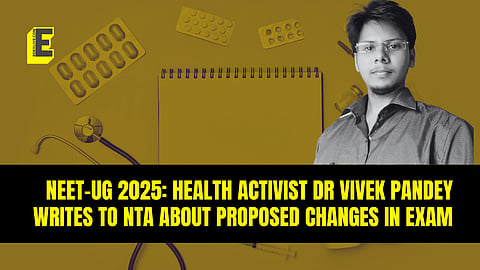

In a formal letter addressed to the National Testing Agency (NTA) and the Ministry of Education, health activist Dr Vivek Pandey has raised concerns regarding proposed changes to the National Eligibility cum Entrance Test - Undergraduate (NEET-UG) 2025 exam format.
Dr Vivek Pandey’s letter, dated November 9, 2024, opposes the potential introduction of age and attempt limits, as well as the shift to an online multi-session examination format, calling the changes "unfair" and "detrimental" to students from disadvantaged backgrounds.
The NTA recently disclosed a list of potential changes in the NEET-UG 2025 examination, that are currently under review by a High-Powered Expert Committee, established on the directions of the Supreme Court.
Objections to proposed changes
The letter argues that age and attempt restrictions would unfairly pressure students, especially those from economically weaker backgrounds, many of whom may require additional time and resources to prepare for such a competitive exam.
He also referenced an order from the National Medical Commission (NMC) that had previously removed age restrictions for NEET, which was intended to make medical education accessible to all deserving students. Dr Pandey contends that the reintroduction of these limits would contradict the NMC's efforts toward educational accessibility.
Concerns over Multi-Session Online Format?
Another major point of contention is the proposed shift to a multi-session online exam format.
Pandey expressed that this change could lead to inconsistencies in question difficulty across sessions, even with normalisation measures in place.
"A multi-session model risks compromising exam integrity and the equal treatment of candidates," he argued.
Proposed alternative: Two-stage examination
To address the rising number of NEET applicants without compromising fairness, Dr Pandey suggests an alternative two-stage examination format, resembling the structure of the Joint Entrance Examination (JEE), with a preliminary exam followed by a main exam for those who qualify.
This approach, according to him, would allow the NTA to manage applicant numbers while avoiding the potential inequities of a multi-session format.
